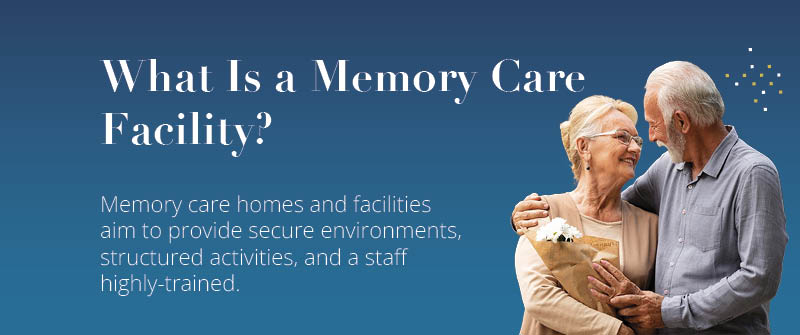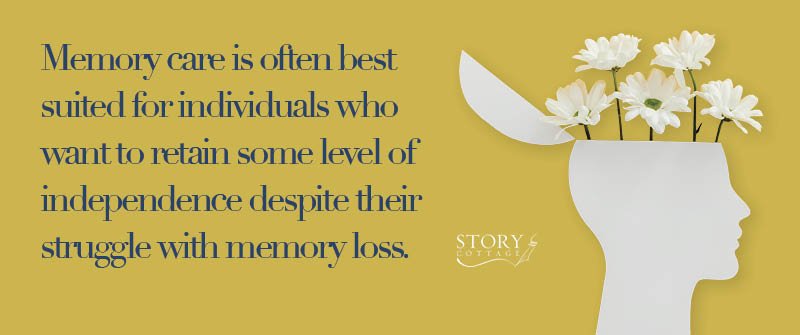Memory Care Requirements
Memory loss is a difficult thing for individuals and family members to grapple with. Unfortunately, memory care services can also be extremely confusing for those not already informed about them.
What is memory care, what are memory care requirements, how is it different from other kinds of care and assisted living communities, and who regulates it in your state are all important questions that you might have on your mind.
In this blog, we’ll aim to answer common memory care questions so you can move forward in this process with the confidence and informed decision-making that you and your loved one deserve.
What Is Memory Care?
Memory care is a form of long-term care designed for those dealing with memory-affecting conditions such as Alzheimer’s disease, amnesia, and dementia. It provides dedicated, specialized care for individuals experiencing memory issues. Some nursing homes and retirement communities have specified memory care units, sections, or “neighborhoods,” but typically, when people discuss memory care, they are referring to dedicated memory care communities and facilities, or a skilled nursing facility that can offer even particularly specialized care.
What Is a Memory Care Facility?
Similar to assisted living facilities but more tailored to those dealing with conditions that can result in memory deterioration, memory care homes, and skilled nursing facilities aim to provide secure environments, structured activities, and highly-trained staff to meet the needs of those experiencing memory loss.

Some of the same services that memory care facilities often provide include:
- Physical therapy
- Medication management
- 24-hour staff supervision
- Assistance with personal grooming
- Housekeeping and laundry services
- Meal planning, prepping, and service
Is Memory Care the Same as Alzheimer’s?
Memory care services are specifically designed for people with conditions like Alzheimer’s in mind. Memory care facilities are intended to provide safe, structured environments that help alleviate the stress that people experiencing memory loss can so often feel. They do this by providing routines, daily assistance, meal care, and more. Depending on the state of an individual’s Alzheimer’s, they may be better suited for a dementia care facility, which provides more intensive care for those experiencing advanced memory impairment.
Is Memory Care Considered Skilled Nursing?
While memory care professionals are highly skilled practitioners, they are not generally part of what are called skilled nursing facilities, and the two are considered different entities. Memory care facilities are specifically designed for those experiencing Alzheimer’s, dementia, or other memory issues and will only serve those experiencing symptoms of memory loss. Skilled nursing facilities, on the other hand, are specialized to handle other specific needs, with memory care not being the primary focus.
What’s the Difference Between Skilled Nursing and Memory Care?
Skilled nursing facilities are typically dedicated parts of a hospital and offer specialized services for specific circumstances, such as for someone recovering from surgery. They often have a specialized staff, including roles like speech-language pathologists, audiologists, and rehabilitation specialists, to name a few. Memory care facilities typically don’t have this kind of staff and instead hire caregiver professionals trained in memory care to better serve individuals experiencing memory loss.
What Is the Difference Between Memory Care and Dementia Care?
There are many similarities between memory care and dementia care. The main difference between memory care and dementia care lies in the scope of the care provided. Memory care is often best suited for individuals who want to retain some level of independence despite their struggle with memory loss. Dementia care is typically more intensive and skilled as dementia patients often require more hands-on assistance with their activities of daily living (ADLs). Some examples of dementia care services, especially for those suffering from advanced neurodegeneration, include 24-hour supervision, medication management, nutrition and meal assistance, and physical therapy.

Understanding Staffing and Training in Memory Care Facilities
Compassionate Care, Professional Expertise
At the core of memory care facilities are the dedicated individuals who provide care and support to those living with Alzheimer’s and other forms of dementia. It’s a role that demands not just professional skills, but also a deep well of compassion and understanding.
Staffing: More Than Just Numbers
When it comes to staffing, it’s crucial that memory care facilities maintain a ratio that allows for individualized attention. Each resident has unique needs and challenges, and a lower staff-to-resident ratio ensures that each person receives the care and support they need. But it’s not just about numbers. The composition of the staff matters too – from certified nursing assistants to specialized dementia care professionals, each plays a vital role.
Training: The Foundation of Quality Care
Training is where quality care begins. Staff at memory care facilities undergo extensive training that equips them with the knowledge and skills to provide specialized care. This training covers a wide range of topics, including:
- Understanding Alzheimer’s and Dementia: An in-depth understanding of these conditions is fundamental. Staff learn about the progression of the diseases, how they affect memory, behavior, and physical abilities, and how to tailor care accordingly.
- Communication Skills: Effective communication is key in dementia care. Training focuses on how to connect with residents who may have difficulty expressing themselves, using techniques that are both respectful and effective.
- Behavior Management: Dementia can lead to challenging behaviors. Staff are trained in identifying triggers and employing strategies to address these behaviors compassionately and effectively.
- Safety and Emergency Procedures: Ensuring the safety of residents is paramount. Staff are trained in safety protocols and emergency response specific to the needs of those with memory impairments.
- Empathy and Compassion Training: Perhaps the most important aspect, this training helps staff understand the emotional and psychological needs of residents, fostering a culture of empathy and compassion.
The Role of Continuous Education
The field of dementia care is always evolving. Continuous education is vital for staff to stay updated on the latest research, care techniques, and best practices. This ongoing learning ensures that care approaches are based on the most current understanding of memory care.
Who Regulates Memory Care Facilities In Florida?
For memory care in Florida, the Agency for Health Care Administration (AHCA) regulates assisted living facilities and memory care facilities. Their state regulations for memory care declare that caregivers must receive dementia-specific training to work in communities that are designated to provide memory care services. Additionally, Florida’s state requirements for assisted living facilities ensure that administrators at memory care facilities receive dementia-specific training.
Who Regulates Memory Care Facilities In Indiana?
There are two Indiana agencies that have jurisdiction over assisted living and memory care services: the Indiana Department of Health (IDOH) and the Family and Social Services Administration (FFSA).
State regulations for assisted living in Indiana also require caregivers to receive dementia-specific training in order to work at memory care facilities. Additionally, in Indiana, residents are required to be screened for cognitive impairments before being admitted to a memory care facility (which is not the case in Florida).
Story Cottage: More Than Other Assisted Living Facilities
For dedicated and compassionate memory care support for your loved one experiencing memory loss, Story Cottage is the place for you. Our comfortable, private, and secure memory care homes provide individuals struggling with memory loss with customized accommodations, multiple layers of security, and empathetic support from passionate and nurturing nurses, caregivers, and house managers. If you’re located in Indiana or Flordia, why not schedule a visit to Story Cottage Carey Grovel, Story Cottage Meridian Hills, or Story Cottage West Clay to see our innovative solutions and comfortable homes? Contact us today to learn more!